Women in Engineering forum hosts confidence building workshop
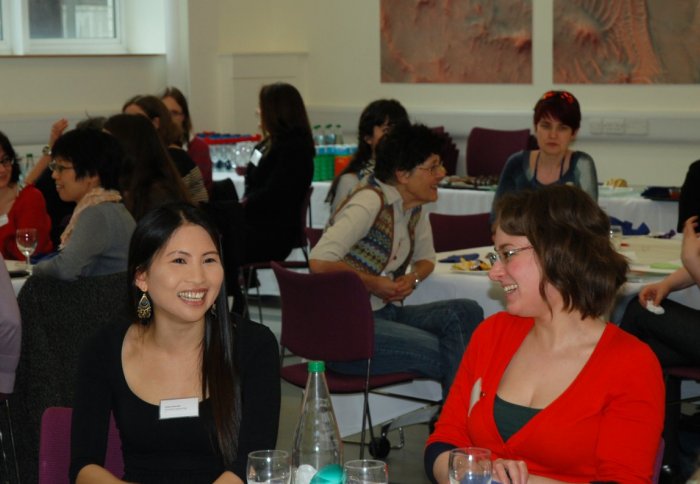
An engaging and interactive confidence building workshop was held on Monday as part of the Imperial Women in Engineering Forum.
Following the success of the inaugural event in December, the second gathering of the forum saw female staff from across the Faculty openly discuss issues of self-confidence and ways to improve self-esteem.
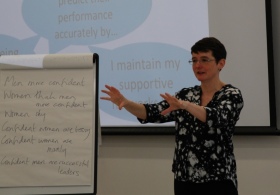 Led by Rebecca Nestor, a freelance learning and development consultant who specialises in gender equality, the lunchtime session sought to act upon the results of the short survey that went out to all female Academic and Research staff in the Faculty of Engineering, where 51% of respondents stated that increased opportunity to discuss techniques and strategies for improving self-confidence would be greatly appreciated.
Led by Rebecca Nestor, a freelance learning and development consultant who specialises in gender equality, the lunchtime session sought to act upon the results of the short survey that went out to all female Academic and Research staff in the Faculty of Engineering, where 51% of respondents stated that increased opportunity to discuss techniques and strategies for improving self-confidence would be greatly appreciated.
The workshop addressed the issue head on, examining the groups’ perception of success and self-confidence and offering some recent research on the subject to inform discussion.
Combating stereotypes
The general consensus was that although it can be difficult for women in an engineering environment to have role models, there are still effective avenues towards self-confidence, including knowing you’ve done something well, getting accurate, constructive feedback from peers and managing emotional status by getting exercise and having access to the natural world.
The group discussed gender-specific stereotypes of confident people, where men appear as leaders while women can be thought of as bossy, and considered whether these can cause women to under-predict their performance, mostly in perceived masculine areas like maths and economics.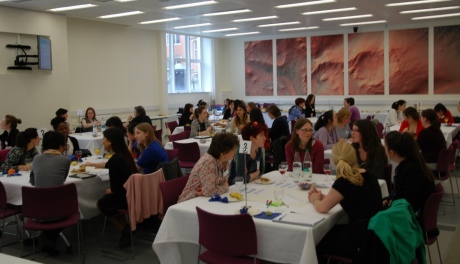
It was the issue of gender stereotypes that dominated discussion, particularly in relation to the way social judgements are made on the basis primarily of the perceived warmth and competence of others.
However, the group examined how we tend to assume (wrongly) that if someone is warm, they will be less competent; and if someone is competent they will be less warm. This is especially damaging in the context of the femininity stereotype, which reinforces an expectation of warmth, but also undermines the route towards self-confidence given its association with low competence.
Imposter syndrome and stereotype threat
Raising the issue of impostor syndrome, where we attribute success to luck or external factors or discount our own achievements, the workshop noted that the syndrome is familiar to many, not just women, but accepted that ‘faking it until you make it’ can sometimes be a strategy towards success.
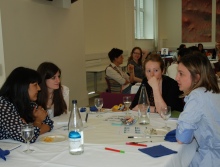 Research has shown that we all experience unconscious bias, based on categories of information we hold that can be hard to correct.
Research has shown that we all experience unconscious bias, based on categories of information we hold that can be hard to correct.
If we make judgements based on these stereotypes we unconsciously store, there is a risk that we will judge ourselves by the same traits: this is known as ‘stereotype threat’ and can be particularly damaging for those operating in environments where they are in a minority.
Building confidence
In such a thought provoking environment it was fitting that the attendees should be given the opportunity to generate some ideas on how to feel more confident.
Ideas ranged from developing support networks and taking ownership of a perceived stereotype, to keeping a clear perspective on life and ensuring that you are always prepared for big events.
There was consensus that taking action and having achievements to reflect on was a better approach than trying to improve confidence through exhorting oneself to be confident.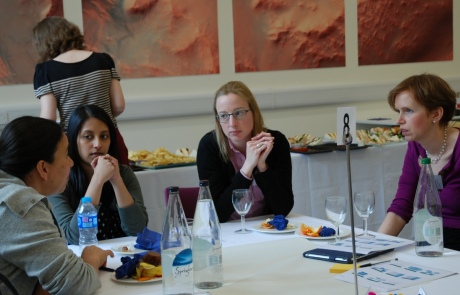
Despite the productive output of these discussions and the ideas that were generated, the spirit of the day dictated that each person should set a personal implementation intention, something not just to remember the workshop by, but a specific goal for taking a step towards greater self-confidence.
If confidence is the outcome of positive experience, forum members will certainly have gone home with a spring in their steps.
Article text (excluding photos or graphics) © Imperial College London.
Photos and graphics subject to third party copyright used with permission or © Imperial College London.
Reporter
Press Office
Communications and Public Affairs
- Email: press.office@imperial.ac.uk
